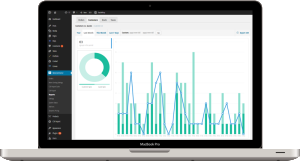
Bounce Rate
Bounce rate is probably one of the most undervalued and underestimated metrics of any website’s search engine optimization campaign. But what is bounce rate and why is it so essential? Well, that’s certainly a very interesting question to ask and unfortunately, Google doesn’t really help you answer it.
Therefore, the first thing we need to do is explain what bounce means in search engine optimization terms. So a bounce is basically when someone uses Google in order to look for a product or service online, finds your website, clicks on it and then clicks the “Back” button on his/her browser in order to get back to the original Google search engine results page. While to some people this may sound like something very complicated, in truth it’s not.
Why Does Bounce Rate Matter?
Google interprets the actions of everyone that uses their search engine, on a very large scale. Since there are billions of searches performed every day on Google, it’s safe to say that there’s a tremendous amount of data that people are looking for and because of that, the search engine giant makes various assumptions about websites and users that some may even think are impossible.
It does these things to ensure that users eventually find what they’re looking for. For instance, Google is fully aware of the fact that knives are indeed associated with swords. While as a human that conclusion is very easy to get to, for a robot like Google, that can be very difficult to grasp. In Google’s case, it has seen thousands of internet pages with the KW “knives” and it also detected that a great percentage of those internet pages also list the keyword “swords”. Because of that, in Google’s eyes, swords and knives are related.
In the same key, let’s picture a website that Google ranks on the 1st page for a specific keyword. As we all know, everyone wants to see their website on the first page of Google’s SERP. Now let’s consider that this website that ranks on the first page of Google receives a lot of traffic, yet a lot of that traffic leaves the website in five seconds or even sooner. To Google, that website isn’t that great or valuable because 95% of the people that clicked on it will leave in five seconds or sooner. So what can a website, in this case, gain in those five seconds or less? Everything about the traffic the website receives is carefully recorded by Google and in the end, Google will choose not to rank that website high for long and that’s because its goal is to offer the top ten search results for websites with relevant content.
How Does Google Measure a Bounce?
There is currently no information about the way Google measures a bounce. Our assumptions have been detailed above, yet it’s obvious that they aren’t perfect nor concrete. We’re actually continuously researching and trying to learn more about the topic, so this is a work in progress. The number one reason why Google doesn’t tell us how they calculate bounce rate is because if they were to reveal their secret, everyone would trick Google into thinking that their website has o% bounce rate.
How Can I Minimize My Sites Bounce Rate?
Minimizing your website’s bounce rate can be both easy and difficult and that’s because no 2 websites are the same. For example, an e-commerce website is much different from a service related website or a blog website. Our theories regarding bounce rate suggest that this rate is calculated differently depending on the type of website we’re talking about. So yes, if you had a hunch about it, you’re right: Google takes footprints into account and it also categorizes websites. The reason it needs to do so is because searchers can at times be pretty vague with their queries.
One thing you could do though in order to lower your bounce rate is to make sure that you build your websites for people and not for the search engines. This is exactly what a seasoned SEO company can help you with.
It’s actually very simple, but only if it’s performed by experienced internet marketers and SEO professionals.When coming up with a website, always try to emphasize with your audience and then put yourself in their shoes. What would you like to see on a website you’ve just clicked on to find the answer to your question? By establishing and delivering the message right away, not only will your bounce rate decrease, but you’re also going to rank a lot higher in Google.
By: David Montalvo.

